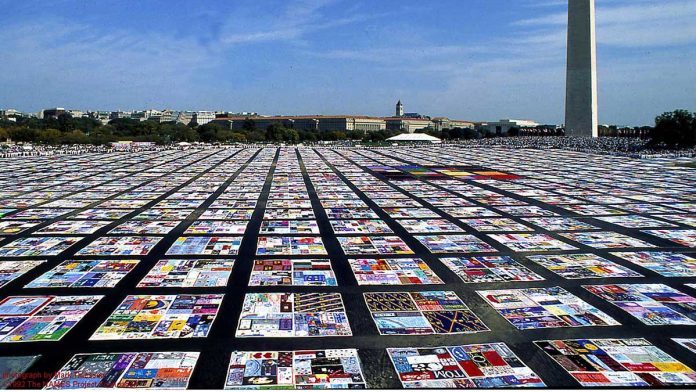Many comparisons have been made between the HIV/AIDS epidemic and the new coronavirus pandemic we’re facing today. Dr. Anthony Fauci, who was instrumental in fighting HIV/AIDS, is now a voice of reason — among many unreasonable voices — in today’s battle. While the coronavirus has garnered an international quick response, the same was not true for HIV/AIDS. Still, the LGBTQ+ community has been “here” before — witnessing loved ones die from an uncontained and untreatable virus. One way our community has mourned and celebrated those we lost is through the AIDS Memorial Quilt, and now, the quilt that’s been essential to our community is giving back during this pandemic. Production on the AIDS Quilt has slowed due to the coronavirus, which has led to excess fabric. That fabric is now being used to sew face masks for essential workers, including doctors, nurses and employees and clients of Bay Area Community Services — a nonprofit providing behavioral health and housing services to teens, adults, older adults and their families. Gert McMullin, who has been involved with the AIDS Memorial Quilt nearly since it began in 1987, has been instrumental in the mask-making project. She told NBC that along with dozens of volunteers, she estimates the AIDS Memorial Quilt effort has distributed 800-900 masks, and she has personally sewn 400-500. She also said, “The fabric we were going to use for people who died is now going to be used for people, hopefully, to live.”
Not just through the AIDS Quilt initiative but in many other ways, the LGBTQ community has risen to the occasion during the coronavirus pandemic — especially in Philadelphia. Local trans leader Deja Alvarez orchestrated grocery deliveries to undocumented Philadelphia residents. Philabundance and William Way make sure those residents at the John C. Anderson Apartments — an LGBT friendly affordable housing complex for seniors — are receiving food. Philadelphia FIGHT continues to operate and offer volunteer services that are unparalleled. The Valley Youth House continues to serve LGBTQ homeless and housing insecure youth. Local LGBTQ leaders have daily phone calls to plan, advocate and listen. The list goes on and on. While our community has suffered endless discrimination and even ridicule, we continue to stand up for each other and also anyone else who is suffering.
The coronavirus pandemic does not disproportionately affect the LGBTQ community as did HIV/AIDS. Other groups of people are more impacted than we are this time, primarily due to age, racism, xenophobia and systemic healthcare failures. But we know what it’s like to have our community dying rapidly around us while other communities don’t have to face the same statistical deaths. This empathy we have derived from decades-long grief allows us the compassion to help others during this new pandemic, and something about that dichotomy of hurt and healing is quite poignant during this somber time.
